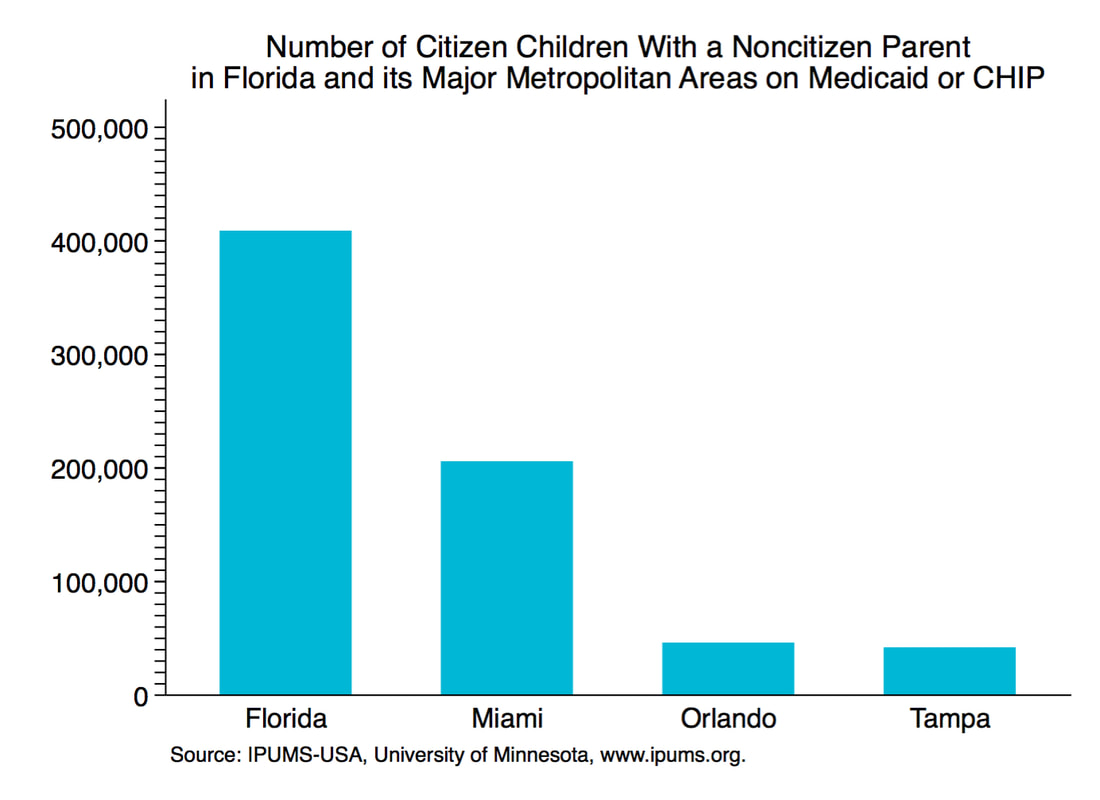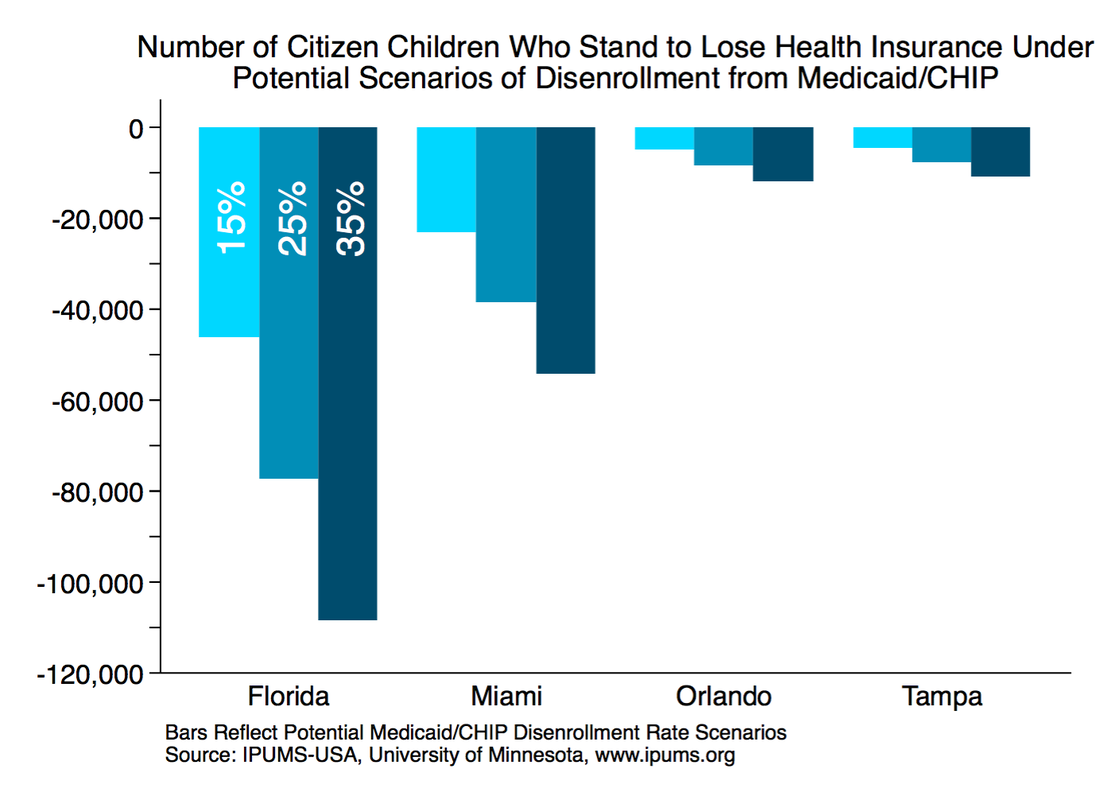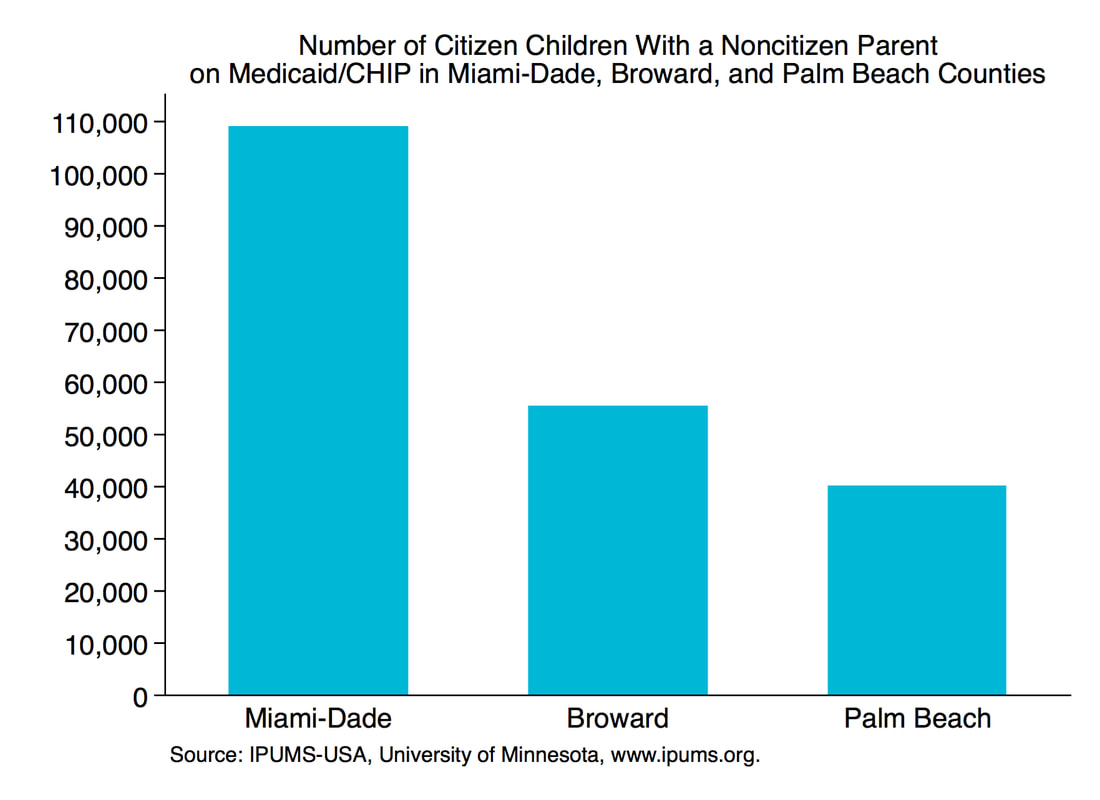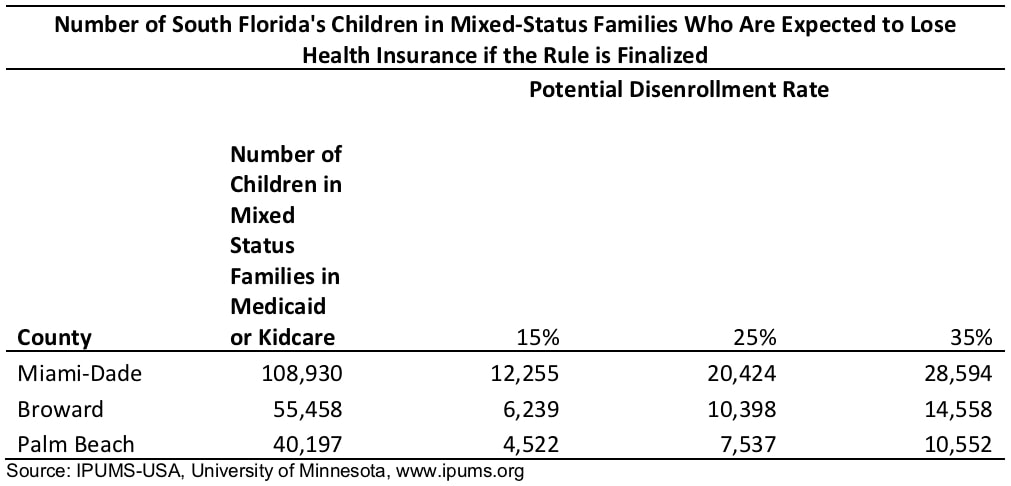
By Matt Childers, Ph.D.
Updated November 14, 2018
On October 10, 2018, the Trump Administration published proposed changes to the “public charge” immigration rules that govern how the use of public benefits affect an immigrant’s legal status. These changes are likely to harm millions of immigrant families across the nation, but states with large immigrant populations will disproportionately feel the impact. In this brief, we analyze the effects that the proposed changes will have on healthcare coverage among U.S.-born children in “mixed-status” families in Florida and its major metropolitan areas (by “mixed-status,” we refer to families whose children are citizens, but one or both of the parents are not). We find that over 107,000 kids will lose health insurance in Florida and over half of them reside in the Miami metropolitan area.
Background
In the proposed rule, the government would redefine who is a “public charge” and expand the criteria used in making that assessment. When an immigrant seeks either legal entry into the U.S. or lawful permanent status, the government determines whether they will become a public charge, and if so, they can deny the application. Current policy defines a public charge as someone who is primarily dependent on the government for subsistence. It also only allows the government to consider whether the applicant receives (or is likely to receive) cash assistance (like SSI or TANF) or government subsidized institutionalized long-term care.
In the draft that the Department of Homeland Security recently posted to their website, the government would alter the policy in significant ways that will dramatically harm immigrants to the U.S. It redefines a public charge as an immigrant who uses or receives one or more public benefits and broadens the scope of programs that count as public benefits for public charge determinations. The expanded list includes: Medicaid, the Medicare Part D Low Income Subsidy Program, Supplemental Nutrition Assistance Program (SNAP), public housing assistance (including Section 8 Housing Voucher Program, Section 8 Rental Assistance) in addition to the programs in the current policy.
Decreased Enrollment in Medicaid/CHIP Among Florida’s Eligible Children.
Lawfully present immigrants eligible for Medicaid or CHIP (Children’s Health Insurance Program or KidCare in FL), as well as citizen children with one or more immigrant parents, are already far more likely to be uninsured than those without immigrant family members based on currently (unfounded) fears of negative immigration consequences. If the draft rule goes forward, this disparity will grow as the new rule will have a considerable chilling effect. While the public charge rule does not apply to immigrants with green cards, many of them will fear that using public benefits would negatively affect their legal status. We saw similar confusion among immigrants after welfare reform in the 1990s when their participation in programs like Medicaid and SNAP declined significantly.
According to the 2016 American Community Survey, there are currently over 400,000 citizen children in Florida who are enrolled in Medicaid or KidCare with a non-citizen parent. As illustrated in the graph below, half live in the Miami metropolitan area (Miami-Dade, Broward, and Palm Beach Counties).

The implications for loss of coverage among Florida’s children–particularly in South Florida– are significant. If the rate of disenrollment ranges from 15 to 35% among these families, between 46,000 and 107,000 children will lose insurance across the state. (The Kaiser Family Foundation used these same scenarios to measure how the changes in the public charge rule would impact Medicaid and KidCare beneficiaries on a national scale. They chose their rates based on scholarly research of how the 1990’s welfare reform laws impacted immigrant families.) The graph below compares the impact in each of the state’s major metropolitan areas to the impact statewide. Again, half of all the children who will be affected by the rule live in greater Miami.

Miami-Dade County Will Be Disproportionately Impacted
Miami-Dade County will be disproportionately impacted by the new rule as it is not only the most populous county in Florida, but more immigrants reside there than any other part of the state. Almost 60% of its residents are foreign-born and 28% are noncitizens. Of the 400,000 citizen children on Medicaid or KidCare with a noncitizen parent, 27% live in Miami-Dade County (approximately 109,000), which is more than twice as high as its neighboring counties to the north. Broward County has 13% of the statewide total (approx. 55,500) and Palm Beach County has 10% of the statewide total (roughly 40,200).
Consequently, Miami-Dade County will see more children lose health insurance than Broward and Palm Beach Counties combined. Using the same disenrollment rates that we previously used, the number of children losing insurance in Miami-Dade County will fall between 12,200 and 29,000. Broward County will see losses in the range of 6,200 to almost 14,500 while we could see between 4,500 to 10,500 children losing health insurance in Palm Beach County.


